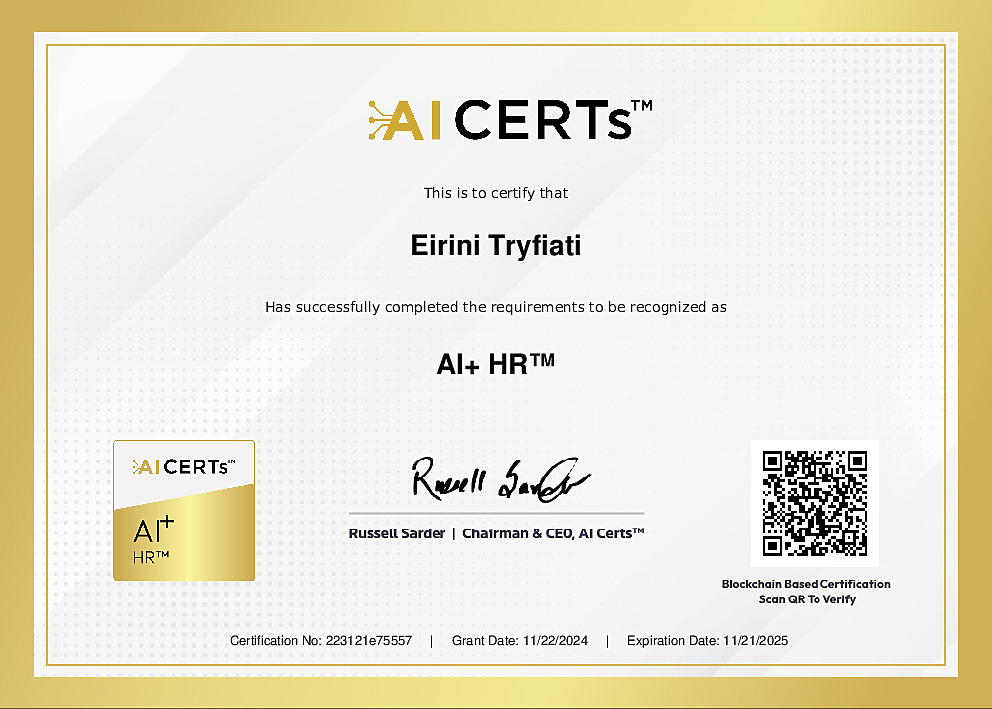AI+ Human Resources™
AP-230
Building Tomorrow's Workforce Today with AI-Driven Solutions- AI in Workforce: Learn to integrate AI for smarter recruitment and performance systems
- Data-Driven HR: Gain insights into talent acquisition and evaluation using ML
- Ethical Application: Understand responsible AI practices in people management
- Future-Ready Skills: Prepare to handle evolving HR dynamics with efficiency and equity
Why This Certification Matters
At a Glance: Course + Exam Overview
- Instructor-Led: 1 day (live or virtual)
- Self-Paced: 8 hours of content

Who Should Enroll?
HR Professionals: Enhance your HR processes by integrating AI tools that improve recruitment, employee engagement, and workforce management.
Talent Acquisition Specialists: Leverage AI to find, assess, and engage candidates more effectively, ensuring the best talent for your organization.
People Analytics Experts: Apply AI-driven analytics to enhance decision-making in HR, from performance reviews to predictive workforce trends.
Business Leaders: Learn to implement AI strategies that streamline HR operations and align talent management with business objectives.
Students & New Graduates: Build a competitive resume by mastering AI-driven HR solutions and preparing for a future in HR tech.
Industry Growth: Empowering HR Teams with Intelligent Recruitment & Retention Tools
- The global AI recruitment market is expected to reach $1.8 billion by 2027, growing at a CAGR of 9.3% (Source: Grand View Research).
- Leveraging AI for continuous feedback, sentiment analysis, and workforce productivity tracking to optimize employee development and performance.
- Personalizing employee training and growth using AI-driven learning pathways, ensuring efficient skill development tailored to individual needs.
- Automating HR workflows for enhanced legal and ethical compliance, streamlining policy management, and reducing operational risk.
- As AI-integrated HR strategies are prioritized by organizations, AI HR expertise is becoming a high-demand skill, offering substantial career growth opportunities.

Skills You’ll Gain
- Strategic Implementation of AI
- Legal Compliance
- Data-Driven Decision Making
- Future-Readiness in HR Technologies
What You'll Learn
- Course Introduction
- 1.1 Introduction to AI Technologies
- 1.2 AI’s Role in HR Evolution
- 1.3 AI Applications in HR
- 1.4 Preparing HR for AI Integration
- 2.1 Revolutionizing Recruitment with AI
- 2.2 Enhancing Onboarding with AI
- 2.3 Implementing AI in Recruitment and Onboarding
- 3.1 Personalizing Employee Development with AI
- 3.2 AI for Employee Engagement and Sentiment Analysis
- 3.3 Implementing AI Solutions for Employee Experience
- 4.1 Introduction to Workforce Analytics
- 4.2 Predictive Analytics for HR
- 4.3 AI in Talent Management and Succession Planning
- 4.4 Ethical Considerations in Workforce Analytics
- 5.1 Understanding Ethical AI in HR
- 5.2 Identifying and Mitigating Bias in AI Tools
- 5.3 Implementing Ethical AI Practices in HR
- 5.4 Building an Ethical AI Culture
- 6.1 Legal Landscape for AI in HR
- 6.2 Compliance Strategies for AI in HR
- 6.3 Navigating Regulatory Changes
- 6.4 Ethical and Legal Alignment
- 7.1 Future Trends in AI and HR
- 7.2 Building Organizational Readiness for AI
- 7.3 Strategic Planning for AI Adoption
- 7.4 Ethical and Future Considerations
- 8.1 Project Planning and Design
- 8.2 Implementation Strategy
- 8.3 Monitoring, Evaluation, and Scaling
- 8.4 Ethical and Legal Considerations
- 1. Understanding AI Agents
- 2. Case Studies
- 3. Hands-On Practice with AI Agents
Tools You’ll Master

TensorFlow

Scikit-learn

AI Fairness 360

Zotero
Prerequisites
- Basic understanding of human resource management principles.
- Knowledge of AI concepts and applications in business settings.
- Familiarity with data analysis and interpretation.
- Proficiency in using computer software and tools for data manipulation.
- A willingness to engage with technical subjects and apply AI technologies in the context of learning and development.
Exam Details
Duration
90 minutes
Passing Score
70% (35/50)
Format
50 multiple-choice/multiple-response questions
Delivery Method
Online via proctored exam platform (flexible scheduling)
Exam Blueprint:
- Foundations of Artificial Intelligence (AI) in HR – 12%
- AI-Enhanced Recruitment and Onboarding – 16%
- Enhancing Employee Experience and Engagement – 12%
- Workforce Analytics and Talent Management – 12%
- Ethical AI and Bias Mitigation – 12%
- Legal Considerations in AI for HR – 12%
- Preparing for the Future of AI in HR – 12%
- Implementing AI in HR: A Practical Workshop – 12%
Choose the Format That Fits Your Schedule
What’s Included (One-Year Subscription + All Updates):
- High-Quality Videos, E-book (PDF & Audio), and Podcasts
- AI Mentor for Personalized Guidance
- Quizzes, Assessments, and Course Resources
- Online Proctored Exam with One Free Retake
- Comprehensive Exam Study Guide
Instructor-Led (Live Virtual/Classroom)
- 1 day of intensive training with live demos
- Real-time Q&A and peer collaboration
- Led by AI Certified Trainers and delivered through Authorized Training Partners
Self-Paced Online
- 8 hours of on-demand video lessons, e-book, and podcasts
- Learn anywhere, anytime, with modular quizzes to track progress
Discover Your Ideal Role-Based Certifications and Programs!
Not sure which certifications to go for? Take our quick assessment to discover the perfect role-based certifications and programs tailored just for you.
Get CertifiedFrequently Asked Questions
The AI+ Human Resources™ Certification Course integrates artificial intelligence (AI) technologies with HR practices. Participants gain insights into data-driven recruitment, AI-enhanced performance management, and ethical considerations in HR.
This course is ideal for HR professionals, managers, and anyone interested in leveraging AI to optimize HR strategies and practices.
Yes, this course is designed to cater to beginners by starting with foundational concepts and gradually progressing to advanced topics in AI and HR integration.
Graduates will gain skills to revolutionize HR practices by fostering efficiency, equity, and innovation in workforce management through AI integration, thereby gaining a competitive edge in the HR industry.
The course is primarily delivered online through modules, interactive quizzes, case studies and practical exercises. Participants can learn at their own pace with access to course materials and resources.





